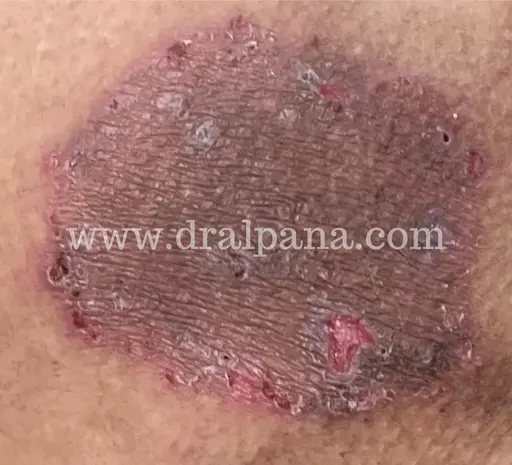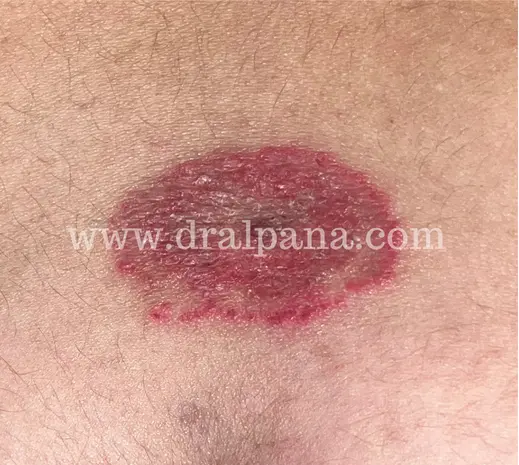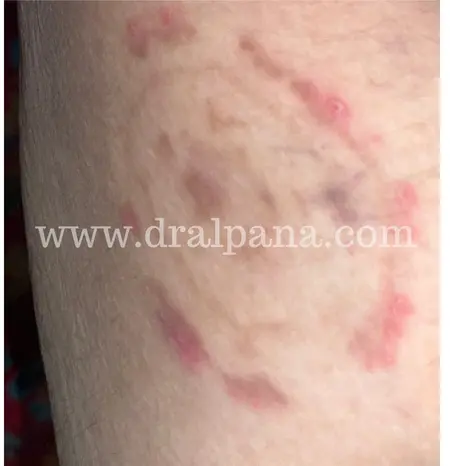Jock Itch Cream: Causes, Remedies, and Recommendations
- Dr. Alpana Mohta
- Oct 15, 2023
- 6 min read
Updated: Mar 1, 2025
Ever felt that itch in the area around your inner thighs that just won't quit? Well, you might be dealing with jock itch.
Tinea cruris (colloquially known as jock itch) is a common fungal infection that loves to hang out in your groin area, causing redness, discomfort, and itching. This infection is caused by fungi called dermatophytes, which thrive in warm, moist environments—the perfect breeding ground on the skin for anyone sweating it out in the gym, pool, or sauna.
This article delves deep into understanding jock itch, the creams available, and recommendations for prevention and treatment.
What Exactly is Jock Itch?
It’s a form of superficial fungal infection affecting keratinized tissues like your skin, hair, and nails. According to clinical studies, the most common dermatophytic species seen in patients with tinea cruris are Trichophyton mentagrophytes and Trichophyton rubrum.
The infection usually starts in the groin and can spread to the inner thighs and buttocks. It’s highly contagious and can be easily picked up from contaminated items like towels, clothes, or shared spaces like gyms, saunas, or steam rooms. And yes, it can spread through intimate contact between partners too.
Who Gets Jock Itch?
Basically, anyone who sweats! So, that's all of us, right? But some are more prone than others. Men are more commonly affected, but women can get it too.
It’s super common in gym-goers, sauna lovers, swimmers, and outdoor workers. Even if you live in cooler climates, you’re not immune—you might have visited a beach or a tropical city, where you stayed in that damn underwear or shorts for too long! And boom, you’ve contracted tinea cruris.
Factors contributing to its onset include:
Sweating: Excessive perspiration can create an ideal environment for fungi.
Tight clothing: Restrictive attire can trap moisture.
Obesity: Skin folds can become damp and warm, promoting fungal growth.
Weakened immune system: Those with a compromised immune system are more susceptible.
How to Know If You Have Jock Itch?
If you've been scratching your groin for over two weeks and have small well demarcated red-to-brown lesions over your groin that doesn’t seem to go away, chances are it’s jock itch. Look for these symptoms:
Red, ring-shaped rash: This rash often spreads outward with a clear center.
Intense itching: This can get worse with exercise.
Flaky or peeling skin: Your skin might start to dry out and flake.
Burning sensation: A burning feeling in the affected area is common.
Bad odor: Severe cases might smell unpleasant.
Unfortunately, it can spread to other parts of the body, like the face, abdomen, hands, and feet. While it doesn’t affect mucous membranes like the mouth or genitalia, it’s still not something to ignore. And no, it doesn’t go deeper than the top layer of your skin, so it won’t infect your blood.
How Jock Itch Creams Work
Jock itch creams contain antifungal ingredients that target the fungi causing the infection. They work by either killing the fungi or inhibiting their growth, relieving symptoms and clearing the infection.
Over-the-Counter (OTC) Jock Itch Creams
A variety of OTC jock itch creams are available.
Most of these will contain Clotrimazole which is an antifungal and has been found to be very effective against tinea cruris (AKA Jock Itch)
You can use the Lotrimin AF Jock Itch Antifungal, which has 1% Clotrimazole.
Other OTC creams that are also effective may contain the following:
Miconazole: Widely used to tackle skin fungus, Miconazole is effective for a wide range of fungal infections, especially persistent cases.
Product Recommendation: McKesson Cream (Miconazole Nitrate 2%)
Tolnaftate: Tolnaftate prevents fungal growth, great for treatment and prevention. Found to be effective in 80% of cases within two weeks.
Product Recommendation: Tinactin (Tolnaftate 1%)
Prescription-Strength Jock Itch Creams
If OTC treatments fail, or if the jock itch is severe, prescription medications might be necessary. Your dermatologist may prescribe stronger creams like:
Ketoconazole: Potent antifungal often reserved for resistant cases.
Econazole: Effective against most causative fungi.
Luliconazole (Luzu): A newer antifungal agent, Luliconazole is especially effective against Trichophyton rubrum and other fungi causing jock itch.
Additionally, stronger prescription-grade topical antifungal medications like amorolfine, terbinafine, and ciclopirox are used when the fungus becomes resistant to the above medications.
Furthermore, for more severe, widespread or recurrent jock itch, you dermatologist may prescribe oral antifungals like azoles (itraconazole, fluconazole) or terbinafine, which are highly effective in treating tinea infections.
Home Remedies and Natural Solutions
Some people prefer natural remedies, though they may take longer to show results. Popular options include:
Tea Tree Oil: Has antifungal properties.
Apple Cider Vinegar: Diluted solutions can help with itching and inflammation.
Aloe Vera: Soothes irritated skin.
As a dermatologist, I would urge you not to rely on remedies and "natural" solutions. Fungal infections can flare up, making your quality of life really bad.
Why Does My Jock Itch Keep Recurring?
Often, people fail to recover completely from jock itch due to misdiagnosis or inappropriate treatment, such as using steroids, which can actually worsen the infection, or stopping antifungal treatment too soon.
Just like how mold can spread and spoil bread in humid weather, fungal infections can quickly worsen if not treated properly. People often mistake the rash for an allergy and stop treatment once the itching subsides, thinking the infection is gone. However, fungal spores could still be growing at a microscopic level. To fully eradicate the fungus, continue antifungal treatment for at least 7-10 days after all symptoms have resolved.
Tips for Using Jock Itch Creams
Always apply on clean and dry skin.
Use the cream as directed, typically twice daily, until the infection clears.
Refrain from using scented soaps or lotions in the affected area. This might irritate the rash further.
Even if symptoms improve, continue treatment as advised to prevent recurrence.
This might be obvious, but scratching these regions is a big no. That could increase the healing time and might also lead to hyperpigmentation. For example, some people might develop dark inner thighs for some period of time after or during the treatment period.
Preventive Measures
Maintain personal hygiene.
Wear breathable, loose-fitting clothes.
Change underwear daily and after sweating. People who face this frequently should opt for loose briefs to keep the area dry, preventing any fungal growth.
Avoid sharing personal items like towels.
Use antifungal powders in susceptible areas.
When to See a Dermatologist?
If the rash:
Continues beyond two weeks of treatment.
Worsens or frequently returns.
Is accompanied by fever or swelling.
In such cases, consult a board-certified dermatologist for expert advice and diagnosis.
By following these guidelines, you can quickly alleviate symptoms and prevent jock itch from affecting your daily life. Stay vigilant, stay dry, and keep that itch at bay!
Frequently Asked Questions (FAQs) About Jock Itch Cream
1. What is the best cream for jock itch?
The best cream depends on the severity of the infection. Commonly recommended OTC creams include Lotrimin AF (Clotrimazole 1%), and Tinactin (Tolnaftate 1%). For more persistent cases, prescription creams like amorolfine or ciclopirox might be necessary.
2. How long does it take for jock itch cream to work?
Most jock itch creams start relieving symptoms within a few days, but it's important to continue using the cream for at least 7-10 days after the rash clears to prevent recurrence.
3. Can jock itch heal on its own?
Jock itch is unlikely to heal on its own and often requires antifungal treatment to fully resolve. Without treatment, the infection can spread and worsen.
4. Is it safe to use jock itch cream on other parts of the body?
Yes, many jock itch creams are safe to use on other fungal infections like athlete’s foot or ringworm, but it’s best to follow the product’s instructions or consult a doctor.
5. Can jock itch come back after treatment?
Yes, jock itch can recur if the underlying cause is not addressed, or if treatment is stopped prematurely. It’s important to complete the full course of antifungal treatment and adopt preventive measures to avoid recurrence.
6. What should I do if OTC jock itch creams don’t work?
If OTC creams don’t work, consult a dermatologist. They may prescribe stronger antifungal medications like oral itraconazole or fluconazole, or topical treatments like amorolfine or ciclopirox, which have higher efficacy.






Comments